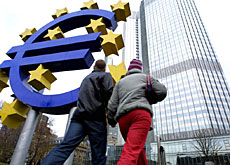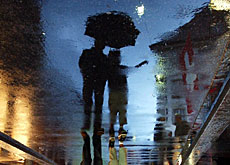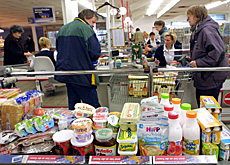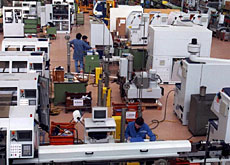Rate cut is mixed blessing for Swiss exporters

The European Central Bank's decision to cut interest rates by half a per cent is a mixed blessing for Swiss exporters.
On the one hand, the cut should boost the euro-zone economies, increasing demand for Swiss products, but it could make Swiss goods more expensive.
The ECB’s rate cut failed to push down the euro – indeed, it rose against the franc and the dollar after the decision was announced.
But at record highs against the franc, the strong euro has already made life easier for Swiss exporters.
“The recent strength of the euro has clearly made life easier for anyone trying to export into the euro zone,” Hillary Cook, an analyst at Barclays Private Clients in London, told swissinfo.
“The fact that the euro has jumped against the Swiss franc despite the cut should make life easier for Swiss exporters going forward,” she said.
However, Cook recognised that the cut in interest rates would only benefit Swiss businesses if economies in the euro zone picked up.
“The best stimulus for the [Swiss] economy would come from demand from the euro zone improving,” she added.
Cook maintained that demand from Switzerland’s largest potential export market, Germany, was “very weak indeed”, because the German economy was currently in the doldrums.
“The hope has to be the German economy picks up, demand for exports picks up and at the end of the day Swiss exporters and the Swiss economy benefit,” she added.
Downturn
Switzerland’s economy too has been bruised by the economic downturn.
The cut in European interest rates came hours after the Swiss government announced that the country’s economy had slipped into recession at the start of the year.
With the gross domestic product (GDP) contracting by one per cent during the first quarter, government officials blamed the strong Swiss franc coupled with weak exports and poor consumer demand.
On Thursday, figures by the State Secretariat for Economic Affairs (Seco) showed two successive quarters of negative GDP growth – in line with economists’ definition of a recession.
The first quarter GDP fell 0.6 per cent from the same quarter a year ago. Seco also sharply revised its figures for the last three months of 2002 downwards, from 1.4 per cent to minus 0.7 per cent.
“We can now consider the winter semester as being a period of recession,” said Aymo Brunetti, Seco’s chief economist.
Switzerland had already recorded two quarters of negative growth at the end of 2001 and the beginning of 2002, although officials refused at the time to talk of a recession.
Meanwhile, the jobless rate for May stood at 3.6 per cent, with 140,609 registered unemployed. The figure – 1,015 down on April – was pushed down by a change in statistical calculations.
No tourists
The first three months of the year were characterised by 9.1 per cent drop in exports compared with the previous quarter.
According to Seco, the strong franc and the European Union’s weakened economy, especially in Germany, wreaked havoc on goods exports, which slumped by eight per cent.
With a drop-off in the tourism sector, the service industry was hit particularly hard, losing over 13 per cent compared with the end of last year.
Investments were down as well, especially in purchases of machinery, precision tools, trucks and aircraft. Seco attributed this to companies’ lack of confidence in their future.
Steady consumers
Consumers, on the other hand, increased their spending by 1.2 per cent from the previous quarter, investing marginally more on housing, healthcare and food.
However, the Swiss spent less on clothing, furniture, leisure and cars.
Imports rose by 5.1 per cent, mainly thanks to pharmaceuticals.
Slow upturn
Seco believes the downward spiral is nearly over and that the situation should improve by next year. Officials said that since the end of hostilities in Iraq, the economy has already begun to pick up.
Seco’s Brunetti warns that the Swiss shouldn’t expect any rapid improvement. “I am reasonably optimistic, but it will all depend on how the economy performs outside of Switzerland,” he said.
Seco reckons the economy will stagnate this year and forecasting GDP growth of 1.6 per cent in 2004.
swissinfo with agencies
Switzerland’s real GDP dropped one per cent during the first quarter compared to the previous three months.
The final quarter of 2002 also recorded negative growth.
The two quarters of negative results means Switzerland has entered a phase of recession.
Exports of goods and services showed the sharpest decline, with the tourism sector suffering in particular.

In compliance with the JTI standards
More: SWI swissinfo.ch certified by the Journalism Trust Initiative



You can find an overview of ongoing debates with our journalists here. Please join us!
If you want to start a conversation about a topic raised in this article or want to report factual errors, email us at english@swissinfo.ch.